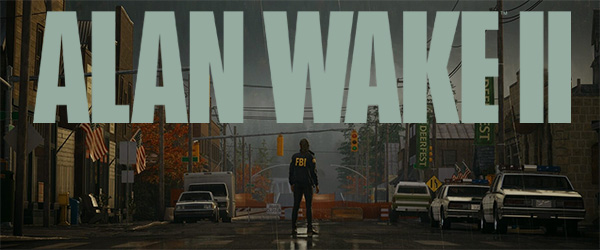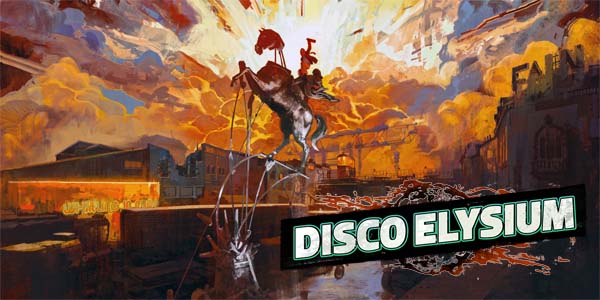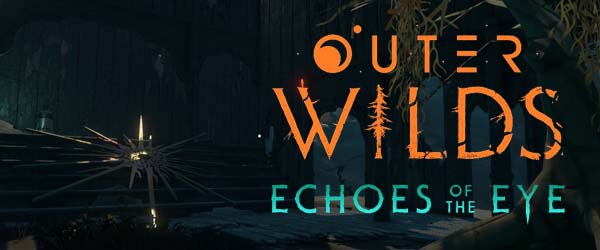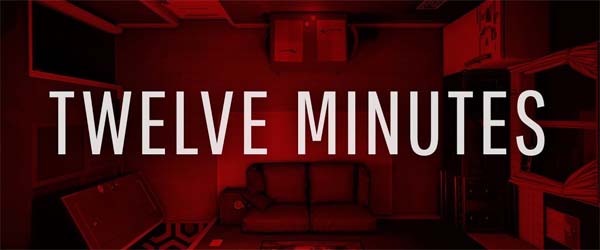
I'll give Remedy this bit of credit: in a world overrun with soul-less, design-by-committee, live-services and vehicles for micro-transaction economies, Alan Wake 2 is a game that actually has a strong creative vision and personality. It follows in the footsteps of Hideo Kojima and Death Stranding by being completely confident in itself and being un-abashedly weird. And just like with Death Stranding, that means that sometimes Alan Wake 2 is genius; other times it's confoundingly stupid and hackneyed!
It's hard even to classify Alan Wake 2 into a single genre. That goes for both narrative genre and also ludic genre. In both cases, it's kind of all over the place. At the most reductionist level, it follows the basic formula of a modern horror game: exploring creepy environments to find keys for doors, fighting monsters as an over-the-shoulder 3rd-person shooter, solving puzzles, and managing a limited inventory. So it's a "horror game", right? In fact, sometimes, it's seriously scary and disturbing. But other times, I'm questioning its "horror" status while I'm laughing out loud to a deliberate joke, or bored out of my mind because nothing scary or particularly exciting has happened in hours. Yet other times still, it's farcically campy or schlocky, and un-intentionally laughable. It's story is ridiculously out there in its concepts and execution, but somehow every beat of the plot is set up and signposted as clearly and obviously as the neon signs that point the player to the next objective in the Dark Place.
Plot twists are signposted more clearly and obviously than the neon signs that often guide the player through levels.
It's also frequently up its own ass. It is, after all, a fictional story about the power of fiction to alter reality (and our perception of reality). It even features the lead designer as a self-insert character within the story. Though surprisingly, he made himself a secondary character instead of one of the 2 playable protagonists. So it's not really about him, but he still found a way to make the entire plot revolve around that secondary character.
In the mind's eye
I feel that Alan Wake 2 is consistently at its best when its sitting firmly in its horror-mystery mode. As such, the opening couple hours of the game really pulled me in and hooked me. The game's main quest and side content are split up into various "cases" for the FBI agent protagonists to solve. There's a mechanic in which the player can retreat into Agent Saga Anderson's "Mind Space", which is an imaginary office room in which she sorts through all the clues she's gathered and strings them together on an imaginary wall in order to fit the puzzle pieces of the mystery together. Each time the player discovers a critical piece of information in the game world, it will show up in the Mind Space's filing cabinet as a new file in a case folder. Putting the clues together in the right way will unlock new lines of inquiry, and can even reveal the next objective.
Agent Anderson can review the known evidence in her imaginary Mind Space office.
Apparently, the actual game doesn't even pause, and continues to play in the background while the player is in the Mind Space. Even though the Mind Space is a full-screen environment, the character can still be attacked by enemies in the "real world". At first, I thought this would be obnoxious, but after the first time I was attacked while trying to re-arrange items on the case board in the Mind Space, I learned my lesson. After that, I actually came to realize that that needing to find a safe, peaceful space in order to let the character think about clues they've discovered (and how to proceed), really helps to emphasize the danger and stakes of the situation.
Arranging the clues in the Mind Space is not very difficult or complicated. It's not like having to solve a person's fate in Return of the Obra Dinn, or anything like that. Most of the time, the process is just going through the motions. Even when there are multiple options for where a piece of evidence can go, the solution can be easily brute-forced without the player having to know anything about what's going on.
The Case Board is an immersive quest log and objective tracker.
Even so, the Mind Space is a creative idea for presenting objectives, quest logs, story summaries, and characterization. The Mind Space at least tries to force the player to have to engage with the events of the story in a meaningful and immersive way. The player has to at least pretend to know how the various events of the story, the characters, and the McGuffins you find all fit together in the broader story in order to progress the main story or side quests.
And in fact, the entire game is about the interplay between the audience and the fiction. For most of the story, it's about the ability of fiction to re-shape people's perception of reality, but as the game goes on, it becomes more and more about the audience's ability to shape or re-shape the actual fiction. It emphasizes that any creative work is made up of both the voices of its creator(s) and also the interpretation and reception of the audience. This has always been true, with all forms of fiction and story-telling, but it's even more true with video games.
[More]
70bf8397-0bac-4efb-82b9-fb0c24ee8da7|0|.0
Tags:Alan Wake, Alan Wake 2, Remedy, PS5, horror, fiction, shooter, mystery, investigation, light, dark, shadow, flashlight, forest, paranormal, music, cult, Federal Bureau of Investigation, Federal Bureau of Control

It's kind of hard to play a lot of video games while holding an infant child. It's certainly possible, but I had to accept that I was going to be less precise in my inputs whether I was holding a PlayStation controller or a keyboard and mouse. It seemed like a perfect time to try out a game that only requires a mouse to play -- a perfect time to finally try out Disco Elysium!
Disco Elysium is a unique and experimental RPG that straddles the line between RPG, point-and-click adventure, and walking sim. Most RPGs have combat of varying degrees of complexity in order to give all the various character stats and progression systems something to do. Disco Elysium completely eschews those conventions. I think I fired a gun maybe three times in my entire play time with the game (across a campaign and a half that I played prior to reviewing), and one of those gunshots was against a corpse hanging from a tree. Oh and I roundhouse kicked a a racist beefcake (you know, in order to establish my own racial superiority). Not exactly Call of Duty over here.
It may not require the twitch reflexes that many "gamer bros" expect every game to have, but games like this have been a godsend for those of us who only have one free hand to hold a mouse, because the other arm is holding a sleeping infant. It also happens to be a really good game.
I maybe fired a gun thrice, and roundhouse kicked a racist once, in 40+ hours of gameplay.
Inner dialogue
Instead of channeling character stats into gauntlets of filler combat encounters as a way of accumulating experience to improve those stats for the next combat encounters, Disco Elysium channels all of its character attributes into conversation trees. But these conversations aren't just with the other characters who I interview as part of the murder mystery plot. These conversations are also with the character's own inner monologue.
You see, the skills in Disco Elysium aren't like the skills of most other RPGs. They don't determine the character's physical strength, or agility, or skill with various weapons, or a blanket "charisma" attribute that determines if people believe your lies or are swayed by your arguments. No, instead, all of the skills of Disco Elysium represent elements of the protagonist's personality and psyche. Those skills will even pop up during dialogue and allow the character to have arguments or conversations with his own inner monologue. Each skill is like a voice in the protagonist's head, telling him what to do, or how to interpret the events he encounters. Each skill is sort of a character in its own right.
The character's skills talk to him, giving the player insight into the game world and current circumstances,
and also (sometimes flawed) advice about how to proceed.
I'm reminded of the psychosis voices of Hellblade: Senua's Sacrifice, with each voice shouting over the others trying to tell Senua what to do or telling her that she's worthless and can't do anything right. Except in Disco Elysium, the player can actually have conversations with those voices. You can talk back to them.
These skills will pop up from time to time as interjections during conversations to make observations about what is happening or to recommend specific courses or action or responses. It's also a great way of delivering exposition and ensuring that the player knows any relevant details that the character should know. But they aren't always completely reliable. Sometimes blindly following the advice of these skills can land you in trouble.
[More]
80bc8a20-3326-45b8-b069-a9aa846f0548|0|.0
Tags:Disco Elysium, Steam, PC, indie gaming, za/um studio, RPG, Estonia, point-and-click, walking simulator, skills, internal monologue, alcoholism, drug addiction, politics, union, strike, communism, fascism, nationalism, racism, sexism, liberalism, murder, mystery, police, crime

When I played it last year (after waiting over a year for its timed Epic Store exclusivity to end), Outer Wilds quickly became one of my favorite games ever due to its innovative sci-fi, exploratory gameplay in its dynamic sandbox solar system full of interesting places that are genuinely worth exploring. It was a compelling sci-fi game about the nature of science and the desire to find out place in the universe. It was also a compelling player-driven mystery game that doesn't hold the player's hand and which provides genuine "eureka!" moments.
I wasn't expecting an expansion because the game seemed so perfect and self-contained that I struggled to even think of what could be included in an expansion. Would they add more planets to the solar system? Would it be a stand-alone prequel with the player playing as one of the extinct Nomai?
But I sure as hell was not going to pass up an excuse to revisit Timber Hearth!
I wasn't going to pass up an excuse to revisit Timber Hearth!
River rafting around the world
One of my favorite things about Outer Wilds is its open-ended exploration of the hand-crafted solar system. Each world is a little puzzle box for the player to unlock, with the solutions to every puzzle involving some sci-fi physics concept that the player has to learn and apply.
The puzzles of Echoes of the Eye don't seem to have that same sci-fi quality to them. Most puzzles involve the use of light, and feel like they could be puzzles in any earthbound adventure or fantasy setting. I just point flashlights at things to trigger mechanisms, turn lights off or on to trigger secret passageways, or turn off my source of light to sneak past photo-sensitive sentries in the dark. I guess I should praise the puzzle design for never falling back on the tried-and-true (yet rote) method of reflecting light off mirrors or through prisms. The actual puzzles are a bit more clever than this, but I just don't find it to be a very engaging or interesting gimmick, especially compared to how novel and creative the core Outer Wilds puzzle box is.
The use of light as the instrument for most interactions with Echoes of the Eye seems to be the result of a concerted effort by the developers to use base game mechanics that are under-utilized in the base game, such as the flashlight and ability to nap at bonfires. The puzzles just lack that sense of awe and discovery that comes with progressing in the base game.
Echoes of the Eye starts off strong with solving a space-based mystery.
Some of the late puzzles do start to embrace Outer Wilds's sci-fi nature. They hide some very fun and interesting surprises that really mess with the player's perception of reality in a very video-game-meta sort of way. But they are so esoteric that the game almost has to literally tell the player what to do. It's like "summoning the tornado in Simon's Quest" levels of esoteric at times.
Honestly, I think the single best puzzle in the game is the one that the player has to solve just to get access to the DLC! It's also the most "Outer Wilds" feeling puzzle in the game. The developers managed to cleverly hide the DLC in plain sight, as if it had been there all along.
The opening for the DLC tasks the player with finding a remote satellite and solving a simple puzzle involving it. Then the expansion treats the player with the awe-inspiring discovery of a massive hidden world that makes up the expansion's primary setting. After that, however, everything feels like pretty typical adventure game stuff. Instead of planet-hopping in a tiny space capsule, I find myself white-water rafting and watching home movies on slide projectors. Later on, there's some horror-adjacent exploration of dark spaces with just a flashlight, and even a little bit of hide-and-seek. Again, it's nothing I haven't seen in a hundred other indie games.
[More]
15313440-eb6a-44bf-a4ea-2d4d369d1f4e|0|.0
Tags:Outer Wilds, Echoes of the Eye, Steam, PC, Epic Game Store, science fiction, mystery, exploration, open world, Eye of the Universe, solar system, space, ring world

It may have taken almost 20 years after Majora's Mask, but it looks like time loop games have suddenly become an emerging fad. Not that it's a bad thing, per se. Outer Wilds has, after all, become one of my favorite games ever. Twelve Minutes is much more scaled-down and far less ambitious than Outer Wilds; it takes place entirely within a small, one-bedroom apartment, and the individual loops average 5-10 minutes instead of the 22-minute loops of Outer Wilds.
12 Minutes has a high-degree of responsiveness to player actions.
12 Minutes is also a much more straight-forward point-and-click puzzle-adventure game in a vein much more reminiscent of classic Lucasarts games. There's only a handful of interactive objects in the apartment, and each one has a variety of different uses. In this way, 12 Minutes rather explicitly telegraphs the solutions to puzzles, since there's only a handful of things that the player can even try. The options available to the player lead the player down the path to progress, and if you ever get stumped, idle conversation will often provide clues as to what you could maybe try next.
Although the seams in the facade do become evident if the player gets stuck repeating a particular loop too many times, I did find myself impressed by just how naturally reactive 12 Minutes is to player interference. The wife and cop will react believably to many things that the player might do, including some off-the-wall things. The wife might comment on weird or rude behavior by me, or the entire time loop may go in a completely unexpected direction because I chose to do something slightly different. It's a surprisingly wide and robust possibility space.
The short duration of time loops, and the relatively small amount of intractable objects really encourages lots of player experimentation. Screwing up any given loop doesn't lose a whole lot of progress, so there's very little penalty for trying some seemingly-crazy solution on a whim, and sometimes, it will even reward the player with some new piece of information that you didn't have before, or a clue to how you might proceed.
12 Minutes provides lots of subtle clues for ways to proceed.
12 Minutes is also quite good about providing clues that are subtle enough to not be obvious spoilers of what to do next, but which might still make you facepalm in retrospect "of course that's what I should have done!" What makes these clues work without feeling like they solve the game for you is that there is often multiple ways to go about testing them. The wife making an off-hand comment about needing to clean the closet is, in retrospect, an obvious clue that the player should check the closet. There is a useful object in there, but its usefulness isn't necessarily immediately obvious. What might also not be immediately obvious is that there's another way that the closet is immediately useful, it just has nothing to do with the object you found there.
[More]
![Event [0] - title](/image.axd/2021/3/Event0-title-600x250.jpg)
Continuing on through my years-old backlog of indie Steam games, I moved away from Bloober Team games, but stuck with the sci-fi genre and played one of the most innovative games from 2016. I may be five years late to this one, but Event [0] is still a unique sci-fi mystery game that no other developers seem to have tried to emulate. As such, the game still holds up quite well.
The central premise here is that you find yourself in an abandoned space station in orbit around Jupiter. Your only companion is an onboard A.I. named Kaizen who talks to you through text on computer terminals scattered throughout the small station. The gimmick here is that all your interactions with Kaizen are handled by typing questions or commands into the computer terminals using your keyboard. The game uses some natural speech recognition algorithms to parse your text, interpret its meaning, and compose an appropriate response for Kaizen. It's like installing CleverBot into your game as an NPC.
The only other character is the possibly-malfunctioning onboard A.I., who you can type questions or commands to.
Even 5 years later, it's still a wholly unique way of interacting with an in-game NPC, and Kaizen comes off as being fairly believable. It certainly helps that the developers decided to make Kaizen an A.I. character instead of a human NPC, since it makes your interactions with Kaizen feel a bit more natural and believable. And when Kaizen gives a nonsensical response, it's easy to chalk it up to it being a malfunctioning A.I..
You are expected to explore the space station, investigating the environment for clues, and asking Kaizen questions to help you unravel the mystery of what happened to the crew of the station. The station only has a handful of rooms, and only had [I think] 3 crew members on it, so it doesn't take long to figure out what happened. In fact, the whole game is playable within about 2 or 3 hours, and repeat play throughs (to get alternate endings or whatever) can be completed in an hour or less. [More]
|

| 12 | | | | | | | 60 | | 11 | | | | | | | 55 | | 10 | | | | | | | 50 | | 09 | | | | | | | 45 | | 08 | | | | | | | 40 | | 07 | | | | | | | 35 | | 06 | | | | | | | 30 | | 05 | | | | | | | 25 | | 04 | | | | | | | 20 | | 03 | | | | | | | 15 | | 02 | | | | | | | 10 | | 01 | | | | | | | 05 |
|